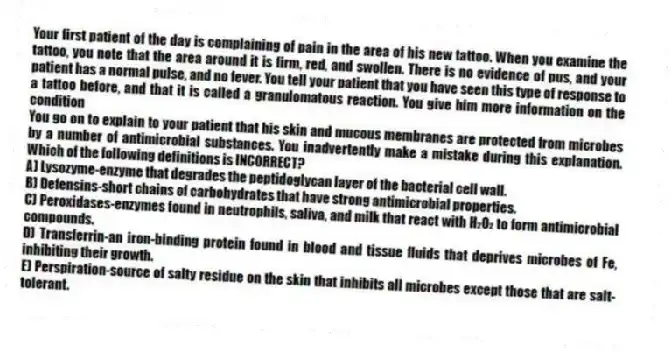
Your first patient of the day is complaining of pain in the area of his new tattoo. When you examine the tattoo, you note that the area around it is firm, red, and swollen. There is no evidence of pus, and your patient has a normal pulse, and no fever. You tell your patient that you have seen this type of response to a tattoo before, and that it is called a granulomatous reaction. You give him more information on the condition
-You go on to explain to your patient that his skin and mucous membranes are protected from microbes by a number of antimicrobial substances. You inadvertently make a mistake during this explanation. Which of the following definitions is INCORRECT?
A) Lysozyme-enzyme that degrades the peptidoglycan layer of the bacterial cell wall.
B) Defensins-short chains of carbohydrates that have strong antimicrobial properties.
C) Peroxidases-enzymes found in neutrophils, saliva, and milk that react with H₂O₂ to form antimicrobial compounds.
D) Transferrin-an iron-binding protein found in blood and tissue fluids that deprives microbes of Fe, inhibiting their growth.
E) Perspiration-source of salty residue on the skin that inhibits all microbes except those that are salt-tolerant.
Correct Answer:
Verified
Q82: Your first patient of the day is
Q83: Which of the following is NOT True
Q84: Your first patient of the day is
Q85: Your first patient of the day is
Q86: Your first patient of the day is
Q88: When microbes are introduced into normally sterile
Q89: Which of the following do you think
Q90: Given the name "leukocyte adhesion deficiency," which
Q91: Given what you understand about inflammation, why
Q92: Your first patient of the day is
Unlock this Answer For Free Now!
View this answer and more for free by performing one of the following actions

Scan the QR code to install the App and get 2 free unlocks

Unlock quizzes for free by uploading documents